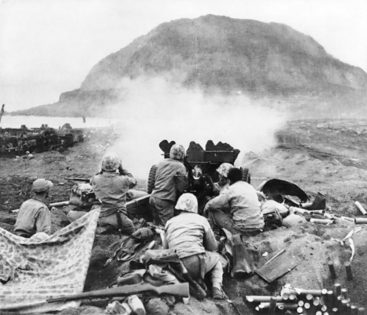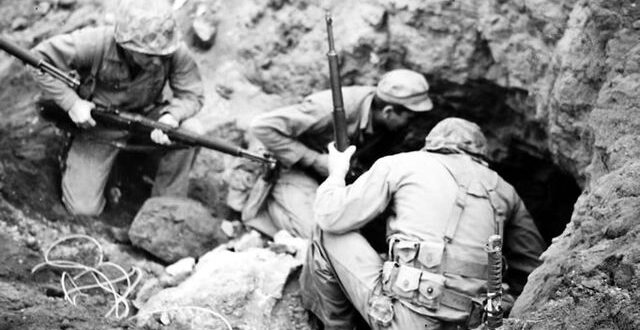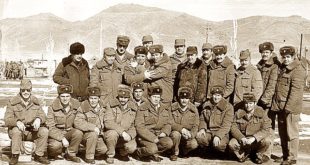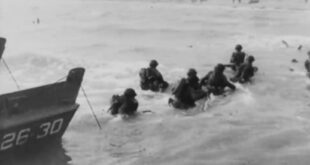Donald Raasch is one of the few men alive who fought in the fiercest battle in Marine Corps history.
by Lance Cpl. David Brandes and Lance Cpl. Ethan Miller
MARINE CORPS BASE QUANTICO, Va. – The corporal dragged his body up the obsidian sheet of sand speckled with other water-logged Marines. He clambered over the peak of an incline, only to find one of his comrades was missing something: his head.
“That kind of woke me up to what we were getting into,” said the nearly 100-year-old Cpl. Donald Raasch, a U.S. Marine Corps veteran.
Raasch, one of the few men still with us today who fought on the island, recently shared his 14-day experience battling on the black sands of Iwo Jima.
His journey began after he graduated Marine Corps Recruit Depot San Diego in 1943. He was then assigned to 26th Marine Regiment, 2nd Battalion, 5th Marine Division on Hawaii, where preparations were made to take Iwo Jima from the Imperial Japanese Army. It was on Feb. 19, 1945, Marines began landing on the eight-square-mile island, coming to full strength at 70,000, but the Japanese outnumbered U.S. forces more than three to one.
Although, when Raasch landed, he said he didn’t see many Japanese. They “scurried” to conceal themselves in caves and underground tunnels to observe U.S. forces approach the volcanic island. Even so, contact was imminent.
“And then I had a little play-catch with a Japanese in a bunker,” he said.
Raasch explained how he slipped a grenade off his belt and threw it into a bunker. He waited for some sort of explosion but heard nothing. He took a chance to peer over the peak, only to see that same grenade hurling back at him. Thankfully – in this case – he had a habit of taping the ignition latch to prevent unintended explosions. Raasch had forgotten to remove the tape before tossing the grenade. As that grenade rolled toward him, he picked it up, peeled the tape off, and threw it back.
“All I saw was his hat flying off in the distance,” he said. “So, I figured his head must be up with it.”
Sometime later, while biding their time on one of the island’s steep ridges, Raasch and the other Marines heard a whistling from the sky. He and his team instinctively jumped to the ground as mortar fire rained down and the Marines found themselves caught in a pitched battle with the cacophony of screams, explosions, shouts, and gunfire.
“It exploded behind me, and it knocked me out,” he said. “I guess what woke me up was somebody hollering ‘corpsman, corpsman!’”
The yelling came from Cpl. Brown, a Marine who Raasch credits for saving his life, but one he never saw again after leaving the island.
“He’s the one that got the corpsman to come over,” Raasch stated simply.

The century-old Marine explained that as the corpsman was taking care of him, he saw Brown leaning against one of the nearby ridges, noticing that the corporal also needed some medical attention as his leg had been blown off. Raasch was shocked Brown still called for his aid.
Raasch was eventually transported back to California to recover from his injuries. He received treatment for his left arm, the only part of which he could move was his thumb, he said. Surgery and recovery took over a year, and he was awarded a purple heart.
Soon after, he found himself leaving the military and trying to acclimate to civilian life in Nebraska. For the next 15 years, he worked for a local power company as a lineman and engineer “climbing poles,” as he said it.
“I just put [Iwo Jima] in the back of my mind,” he said somberly. “You know, when you get back to civilization again, you have to find yourself a job like anybody else to make a living.”
To this day, he continues to share his 14-day story of Iwo Jima with his family members and others.
“I do still go through my old books with some of my brothers’ children and talk about that with them,” he explained. “They like to know that kind of stuff.”
Raasch’s story gives insight of the battle from his point of view, but taking a step back shows us how significant his experience is. Nearly 40 percent of the U.S. Marine force were killed or wounded during the 36-day battle; about 6,000 were killed and another 20,000 were wounded.
Raasch counts himself among one of the few who had the luck to make it home alive.
As the toll on U.S. forces were severe, the Marines officially seized the island on March 26, 1945, boomed by acts of uncommon valor. Symbolic as it was to raise the flags on the volcanic island, taking Iwo Jima also laid a path for the U.S. to destroy Japanese airfields, aiding in the outcome of World War II.
Now, it’s been almost 80 years after the Battle of Iwo Jima, and Raasch is one of the very few men alive today to tell first-hand experiences of the bloodiest battle in Marine Corps history.
 Soldier of Fortune Magazine The Journal of Professional Adventurers
Soldier of Fortune Magazine The Journal of Professional Adventurers






